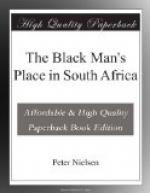To those, who for religious reasons feel doubtful about the righteousness of a plan that denies to the Natives the privilege of social equality which is implied in the ideal of the brotherhood of man, I would quote the words of Paul who, when speaking at Athens of the separation of the sons of Adam, said that God “hath made of one blood all nations of men for to dwell on all the face of the earth, and hath determined the times before appointed, and the bounds of their habitations,"[28] for, whether we take this statement to be the inspired utterance of a holy apostle, or simply the reasoned opinion of an acute observer, we must admit that the words convey the experience of the ages that races which are physically dissimilar tend naturally, and therefore, rightly, to dwell apart within their respective racial boundaries.
Some people have professed to be afraid that the territorial separation of the two races will tend to consolidate the Natives, and thereby foster animosity towards the whites which may eventually lead to open war, but this fear seems to have no ground in reason, because it is not proposed, nor, indeed, would it be physically possible, to segregate the Natives by themselves in one great area. On the contrary, it is proposed to dispose of the Natives, as far as possible, according to present geographical and tribal conditions, in several and separate territories, so that race-consolidation of a kind inimical to the whites will naturally be less likely to occur where the Natives live as separate tribes, speaking their different languages, than where, as in the Southern States of America, the Negroes have English as a common medium for the expression of a common race-interest.
Other people, again, are in doubt as to whether the Natives, as a whole, approve of this policy by which their future existence is to be shaped and determined. The answer is contained in the words of Sir William Beaumont, in his report of the findings of the Native Lands Commission, which gathered evidence from all concerned in 1916, where he says “The great mass of the Native population in all parts of the Union are looking to the Act (the Act providing for territorial separation) to relieve them in two particulars—the first is to give them more land for their stock, and the second is to secure to them fixity of tenure."[29] Regarding the Natives of Rhodesia I am able to say that all the elderly Native men with whom I have spoken about this subject—and I have conversed with a large number—agree that the policy, as outlined in the Native Lands Act and the Native Affairs Act of 1920, as I have explained it to them, is good and sound.




